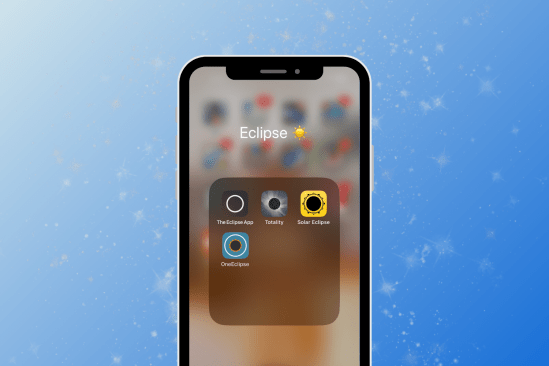
Here are the best apps for viewing and learning about the 2024 solar eclipse.
People all over the world are preparing for the total solar eclipse set to pass across Mexico, the U.S., and Canada on April 8.
Many are set to travel to cities along the path of totality between Texas and Maine; others are reading and seeking to understand more about the celestial event that won’t be seen again from coast to coast for more than 20 years.
There are apps that can help.
While some organizations such as NASA have compiled useful guides for viewing the eclipse and learning more about it, others have developed mobile apps to gather all of the information and tools together in one place.
[time-brightcove not-tgx=”true”]These are the best eclipse apps that TIME tested.
The Eclipse App
The Eclipse App has a sleek, minimalist design, and allows users to see for how long and when a given location will experience total eclipse. But the coolest thing about The Eclipse App is that after selecting a community, users can see events happening in that area around the eclipse.
For example, those viewing the eclipse from Burlington, Vermont, can attend “Total Eclipse at the Hearth,” an event hosted by the Burlington Hearth & Brewery, where a special Black IPA—the “Path of Totality”—is being brewed in celebration.
Read More: How Cities Around the U.S. Are Celebrating the Eclipse
The app is free to download, but by paying $3 for the pro version users unlock cloud forecasts and a guided countdown that lets them know precisely when different eclipse phenomena will begin in their location. The Eclipse App is available in the Apple App Store and the Google Play Store.
Totality
Totality’s main feature is a nifty map that displays the path of the eclipse. Users can share their own location and see how complete the eclipse will be from where they are and at what time it will begin, or find the nearest point on the total eclipse’s track to their location.
Besides that, it has resources for learning more about the eclipse—how to view it safely, what types of eclipses there are, and a list of eclipse-related classroom activities. Totality is free, and is available in the Apple App Store and the Google Play Store.
Read More: How to Use Your Smartphone to Take Photos of the Solar Eclipse
OneEclipse
OneEclipse, which has an old-school design, has a map that allows users to understand what the eclipse will look like from their location, though it lacks the other map-based features that Totality has. It has a brief viewing and safety guide, information on how to recycle eclipse glasses, and offers users a way to share their eclipse story with Astronomers Without Borders, a nonprofit that runs astronomy-related programs.
OneEclipse costs $1.99, half of which goes to Astronomers Without Borders. It’s available in the Apple App Store and the Google Play Store.
Read More: Where You Can Watch the Solar Eclipse
Total Solar Eclipse
Total Solar Eclipse is essentially a collection of useful links to content on the website of Exploratorium, a museum of science, technology, and arts in San Francisco, California. While the content—which spans safety advice, watching tips, and eclipse education—is useful, the fact that users must leave the app to access it means that the experience is a little clunky. Total Solar Eclipse is free, and is available in the Apple App Store and the Google Play Store.